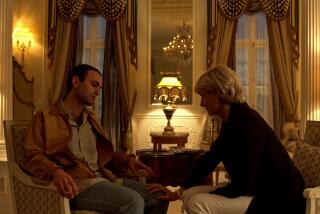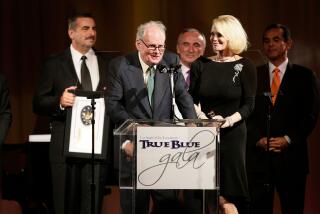Doris Day: Singing and Looking for Pet Projects
CARMEL — The new owner of the Cypress Inn Hotel sat sipping a glass of white wine in one of the cool and high-ceilinged ground floor guest rooms. The hotel is by California standards historic, built in 1929 in the Spanish Colonial Revival Style associated with Santa Barbara. It is a quietly elegant oasis in the tourist-teeming town where you can get a bumper sticker that says “Clintville.”
One change associated with the new management is that the guests’ dogs will be welcome. Then again Doris Day, who has acquired the hotel as an investment, could hardly espouse any other policy. The love and protection of animals continues to be the ruling passion of her life.
“We will supply dog beds in various sizes to accommodate the pet,” she explained to a recent visitor, “and we’ll have special foods for them.”
Day, who entered the movies in 1948, taking over from Betty Hutton in the Mike Curtiz film “Romance on the High Seas,” was by the ‘50s and ‘60s as important a female star as Hollywood had, with a string of glossy romantic comedies opposite a succession of male stars including Clark Gable and, most often, Rock Hudson.
She conveyed a unique blend of innocent sexiness, a kind of heightened normalcy that was not so much the woman next door as the woman you wished lived next door. She has recently avoided the light of public attention, although in tribute to another of her co-stars, James Stewart, she appeared at the concluding banquet in his honor at the Monterey Film Festival.
Day, who will be 64 in April but looks as if she could do a remake of “Teacher’s Pet” tomorrow, lives not far outside of Carmel on 11 high acres that abound in live oaks and overlook a golf course. It is not far off California 1, a few miles from Quail Lodge, where she spent many a weekend while she was searching for the home she finally found. She moved here from Beverly Hills four years ago, arriving in a caravan of station wagons transporting her already large menagerie.
Just how much larger the menagerie has grown is a secret she prefers to keep, she says, but there are at least 11 dogs and a larger number of cats and a bird. She drives a Wagoneer, often with three large but cheerful dogs for company on her daily trips to town to pick up the mail or to deliver one or another of her charges to the vet.
There is a lot of mail, frequently more than she can carry, the bulk of it from other animal lovers. She founded the Doris Day Pet Foundation in 1977 and more recently set up the Washington-based Doris Day Animal League, which exists primarily to lobby Congress for legislation to prevent animal experimentation abuses.
“I answer and sign everything,” she says. “It’s for the animals. I think it has to be personal. It has to be just right.”
She has not made a film since “With Six You Get Eggroll” in 1968 and her last television outing was a series for Pat Robertson’s Christian Broadcasting Network. It was for the premiere show of that series that her old friend Rock Hudson came up to be the first guest.
Day hadn’t seen him in some time and was shocked at his appearance. “I didn’t know what was wrong with him and he didn’t say. I urged him to see a doctor or change doctors, and I tried to persuade him not to do the show until he felt better, but he insisted. Afterward he left and went back to Los Angeles and right on to Paris and it all came out.”
The CBN show stopped when Robertson became an announced presidential candidate. Now there are indications that Day would consider working again.
“I never retired. I never said I’d retired. I just sort of stopped because I’d finished the series on CBS and I was kind of tired. Then I was going with someone who didn’t want me to work. I should have continued on because I love to work.”
That word seems to be around and, Day says, “Things are being written right now. I don’t want to leave my animals and unless I could do a television series here, I don’t think I’d want to try it. A movie’s being written, and if I love the script I’ll do it.”
Her role as Ruth Etting in “Love Me or Leave Me” opposite James Cagney in 1955 proved that she could handle a heavy dramatic role. But her prevailing screen image is as the cheerful, bubbly and continuously virginal heroine most at home in romantic comedies.
The camera, which always has X-ray capabilities, was not wrong to detect the cheerful optimism that seems central to the Day persona. (“You know how I am, que sera ,” she said at one moment in a long conversation.)
She has had need of the optimism: a year of illness at 13, two brief and difficult early marriages, the first at 17 (when she had already been on the road as a band singer for a year). Her third marriage lasted 17 years, but then came the discovery that after years of lucrative success she was teetering at the edge of bankruptcy.
Her business manager, Jerome B. Rosenthal, and husband, Martin Melcher, who died in 1968, had sunk something like $20 million of her earnings into bad investments, most of them in Rosenthal’s own companies.
“I’ve never been one to dwell on the past,” she says, “which is lucky. I could still be an angry woman, kicking things. I don’t know if Marty betrayed me or not. I tend to think he didn’t betray me. I think he loved me.”
After the interminable trial, involving more than 100,000 pages of testimony, on her suit against Rosenthal, a court awarded Day $26 million. This was subsequently scaled down to $6 million. It is not a negligible sum but the shock of the deceptions, even if Melcher was himself an unwitting pawn, as she chooses to believe, is not erased.
“It’s amazing to think that the house I’d paid for 20 years earlier could’ve been taken away from me,” Day says. “It was that close. Marty in desperation had sold me to CBS for a series I knew nothing about, not even the basic idea.
“I was a wreck. I didn’t sleep, couldn’t sleep more than an hour at a time for three months. When Marty died I was so fatigued I couldn’t brush my own hair; I couldn’t lift my arm. I would go for a walk and almost fall to the sidewalk.
“It took me a year to get over his death. And even after his death he was on the set when I worked. I kept thinking I saw him.”
In the late ‘70s she was briefly married for the fourth time, but she and Barry Comden separated after three years.
Having begun her career as a band singer, Day recently started singing again. Just before she did the Robertson series (on which she sang “good news” songs), she had been recording an album of songs written by her producer-composer son Terry, who also sings.
“He sings very well,” she says. “I’m such a perfectionist that if I didn’t think so, I’d tell him to stay out of it. But he does, and one of these days he’s going to have a hit. His other hat is in business. He works with my
accountants and he’s a tremendous help to me.”
She will get around to finishing the album, she thinks, although her animals appear to be more work than a television series. Her Pet Foundation underwrites the spaying and neutering of animals and finds foster homes for strays after they’ve been returned to health.
Her Animal League aims to stop abuses in animal experimentation. “I don’t think it’ll all be eliminated ever; I’m realistic about that,” she says. “I’d like to see it all stopped, but at least if the experiments are done the right way, with no abuse, I guess we have to go along with it. I can’t bear to see anything suffer. And there’s an awful lot of needless experimentation. You need somebody there to watch it all the time.”
She would also like to see laws against dogs riding in the back of pickups. “The wind burns their eyes,” she says, “and if they’re chained so they can’t fall off or jump off, they break their necks if there’s a wreck.”
It is a crusade and she is a crusader, and it is hard to miss the resolve, both steely and passionate, beneath the cheery exterior. “To have the innocents suffer is unthinkable,” Doris Day says. “Most people don’t know about it. I have to do something about it in my lifetime, get it all out there.”
Given the intensity, it’s not too surprising to hear that Day would like to do a dramatic role when she returns to the entertainment wars. “Comedy is harder. It’s unreal. Drama is reality; it’s normal, everyday living.”
She would also like to try improvising everything. “The script would say, ‘Here’s the gist of the scene, now do it.’ I’d adore that. I’m spontaneous. I’ve always liked that first take.”
Day does sound like a performer who wouldn’t mind getting in camera range again, although she says, “I’m working harder than I’ve ever worked, and I’m not even working.”
More to Read
Sign up for The Wild
We’ll help you find the best places to hike, bike and run, as well as the perfect silent spots for meditation and yoga.
You may occasionally receive promotional content from the Los Angeles Times.






